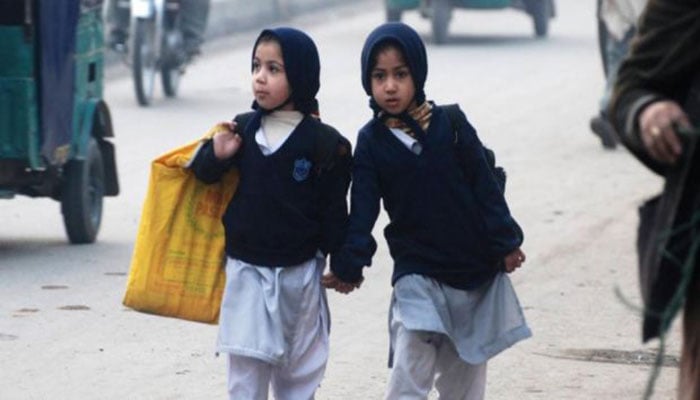Sindh Education Foundation to bring 200,000 children back to school
The Sindh Education Foundation (SEF) is going to establish 1,000 educational institutions across the province under public-private partnership to bring 200,000 out-of-school children back to classrooms.
Chief Minister Syed Murad Ali Shah took the decision during a meeting of the SEF’s board of governors that he chaired at the CM House on Wednesday.
The meeting was told that the SEF plans to set up a thousand schools that will be run by private partners, and these institutions will have the special task of bringing 200,000 out-of-school children back to classrooms. After a discussion, the board members approved the proposal.
Subsidy
SEF Managing Director Abdul Kabir Kazi told the meeting that under the current provision, an annual increase of five per cent in the subsidy on the students enrolled in the SEF school network was approved but no subsidy was granted in the past five years.
He said that the current monthly subsidy framework offers a flat Rs700 per student for all the primary grades and does not incentivise the partners to ensure their progress. He proposed an increase of Rs100 for students of up to grade two and of Rs300 for those in grades three to five, which may incentivise the partners to ensure progress. Higher subsidy rates for post-primary grades will enable the partners to recruit subject specialist teachers, he pointed out.
On the recommendation of the SEF committee, the board approved a monthly subsidy of Rs800 for students of up to grade two, Rs1,000 for those in grades three to five, Rs1,500 for grades six to eight, Rs2,000 for grades nine and 10, and Rs2,200 for grades 11 and 12.
Scholarships
The board decided to offer scholarships to the best students of public schools who got admission on merit in cadet colleges. The SEF’s academic council will select the best students from every cadet college of the province.
The meeting was told that the SEF has been partnering with the Sindh Rangers for 11 schools to extend financial and technical support to the institutions being run by the paramilitary force in remote areas, such as those in border villages.
Other state institutions, like the Pakistan Navy and the Pakistan Air Force, are also running schools in sensitive areas and require adequate support of the SEF for sustainability. After deliberations, the board decided to evolve a separate mechanism to take such schools on board directly under the SEF’s per child subsidy model by signing a memorandum of understanding instead of resorting to a competitive bidding process.
For the schools being run in government buildings, the SEF was allowed to provide need-based financial support to students, for which the foundation would prepare a policy. The meeting was also attended by Education Minister Saeed Ghani, Chief Secretary Mumtaz Ali Shah, Planning & Development Chairman Mohammad Waseem, CM’s Principal Secretary Sajid Jamal Abro, provincial secretaries Ahmed Bux Narejo and Hassan Naqvi, and SEF members Kaiser Bengali, Dr Qazi Masood, Dr Muhammad Memon, Nazir Tunio and Hasnain Qamar Shah.
-
 King Charles ‘very Much’ Wants Andrew To Testify At US Congress
King Charles ‘very Much’ Wants Andrew To Testify At US Congress -
 Rosie O’Donnell Secretly Returned To US To Test Safety
Rosie O’Donnell Secretly Returned To US To Test Safety -
 Meghan Markle, Prince Harry Spotted On Date Night On Valentine’s Day
Meghan Markle, Prince Harry Spotted On Date Night On Valentine’s Day -
 King Charles Butler Spills Valentine’s Day Dinner Blunders
King Charles Butler Spills Valentine’s Day Dinner Blunders -
 Brooklyn Beckham Hits Back At Gordon Ramsay With Subtle Move Over Remark On His Personal Life
Brooklyn Beckham Hits Back At Gordon Ramsay With Subtle Move Over Remark On His Personal Life -
 Meghan Markle Showcases Princess Lilibet Face On Valentine’s Day
Meghan Markle Showcases Princess Lilibet Face On Valentine’s Day -
 Harry Styles Opens Up About Isolation After One Direction Split
Harry Styles Opens Up About Isolation After One Direction Split -
 Shamed Andrew Was ‘face To Face’ With Epstein Files, Mocked For Lying
Shamed Andrew Was ‘face To Face’ With Epstein Files, Mocked For Lying -
 Kanye West Projected To Explode Music Charts With 'Bully' After He Apologized Over Antisemitism
Kanye West Projected To Explode Music Charts With 'Bully' After He Apologized Over Antisemitism -
 Leighton Meester Reflects On How Valentine’s Day Feels Like Now
Leighton Meester Reflects On How Valentine’s Day Feels Like Now -
 Sarah Ferguson ‘won’t Let Go Without A Fight’ After Royal Exile
Sarah Ferguson ‘won’t Let Go Without A Fight’ After Royal Exile -
 Adam Sandler Makes Brutal Confession: 'I Do Not Love Comedy First'
Adam Sandler Makes Brutal Confession: 'I Do Not Love Comedy First' -
 'Harry Potter' Star Rupert Grint Shares Where He Stands Politically
'Harry Potter' Star Rupert Grint Shares Where He Stands Politically -
 Drama Outside Nancy Guthrie's Home Unfolds Described As 'circus'
Drama Outside Nancy Guthrie's Home Unfolds Described As 'circus' -
 Marco Rubio Sends Message Of Unity To Europe
Marco Rubio Sends Message Of Unity To Europe -
 Savannah's Interview With Epstein Victim, Who Sued UK's Andrew, Surfaces Amid Guthrie Abduction
Savannah's Interview With Epstein Victim, Who Sued UK's Andrew, Surfaces Amid Guthrie Abduction




